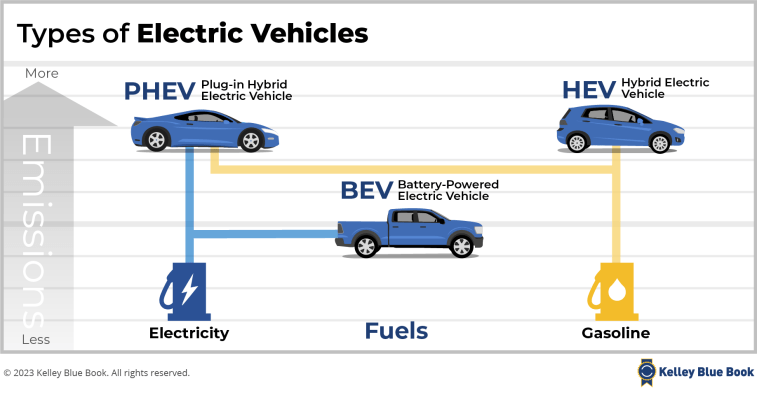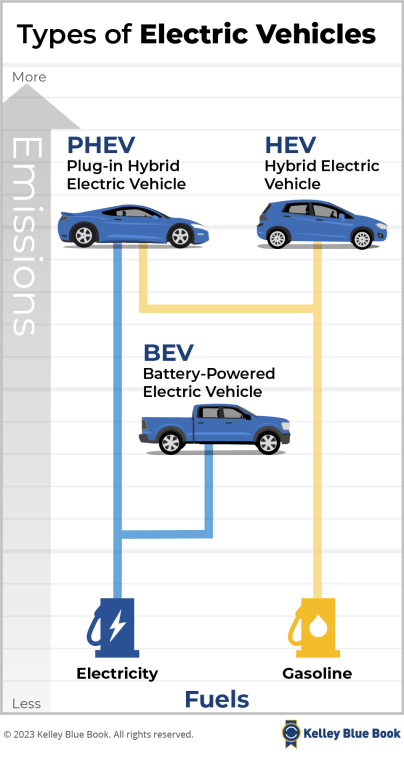If you’re considering alternative fuel vehicles, you likely have an overarching question: Is it better to buy a hybrid or an electric car (EV)?
Choosing the best option is your decision because everyone defines “better” differently, and each type of electrified vehicle has pros and cons. While we can’t decide for you whether a fully electric car or a hybrid is better, we can help by highlighting some fundamental points. Ultimately, your needs, limitations, and preferences will lead you to a smart choice that suits your situation.
Buying a Hybrid vs. an Electric Car
Remember, these basic considerations are a starting point when deciding whether it’s better to buy a hybrid or electric car. Taking the middle road between an EV and a hybrid with a plug-in hybrid (PHEV) might be the best option for some drivers.
| Considerations | Electric Cars | Hybrids |
| Driving habits | EVs are best for city driving, daily commutes, quick errands, and trips with access to charging. | Hybrids are better for long-distance travel and areas with limited public charging stations. |
| Charging accessibility | Home charging brings lower costs and convenient overnight recharges. Otherwise, easy access to public chargers is crucial. | If charging at home isn’t possible, or the nearly 73,000 public EV charging stations in the U.S. aren’t convenient, a hybrid might be a better choice. |
| Upfront cost vs. long-term savings | Kelley Blue Book research shows the average price of EVs in March was more than $59,000. However, electric models have lower operating costs, including maintenance and fuel. | Hybrids have remarkable fuel efficiency, and models like the 2025 Toyota Prius, starting at $29,485, are less expensive than the average EV price. |
| Tax credits and incentives | Some EVs — including leased models — still qualify for federal tax credits, and some states offer incentives. | Regular hybrid models are not eligible for the $7,500 federal tax credit. |
| Maintenance costs | With fewer moving parts, EVs need less maintenance. | Hybrids have an internal combustion engine that requires regular maintenance, including oil changes. |
| Weather conditions | Cold temperatures can reduce EV range significantly, and the air conditioner uses battery power to cool the car in the summer heat. | Hybrids are less affected by temperatures in extreme weather. |
| Environmental impact | Electric cars don’t have gas engines, and driving them doesn’t contribute to smog. | Hybrids burn gasoline and create tailpipe emissions, but emit less carbon dioxide than gas-only vehicles. |
| Resale value | The used EV market is evolving, and some models face less depreciation than others. | The resale value for hybrid vehicles is more stable because of their longer market history. |
Evaluate Your Options With Hybrid or Electric
Test drive an EV, a hybrid, and even a PHEV to experience the differences. An EV’s acceleration, regenerative braking, and one-pedal driving are desirable features that many drivers miss when returning to gas cars. Still, the hybrid’s traditional driving feel and fuel economy are attractive to those not ready for significant changes to their transportation.
If you plan to keep your car for many years, continuing infrastructure improvements can make it easier to choose an EV. Still, a hybrid is a lower-risk option requiring no adjustment to your driving routine, except for fewer stops at gas stations.
Consider these factors and make the best choice based on your driving needs, budget, and future plans.
Editor’s Note: This article has been updated since its initial publication.









